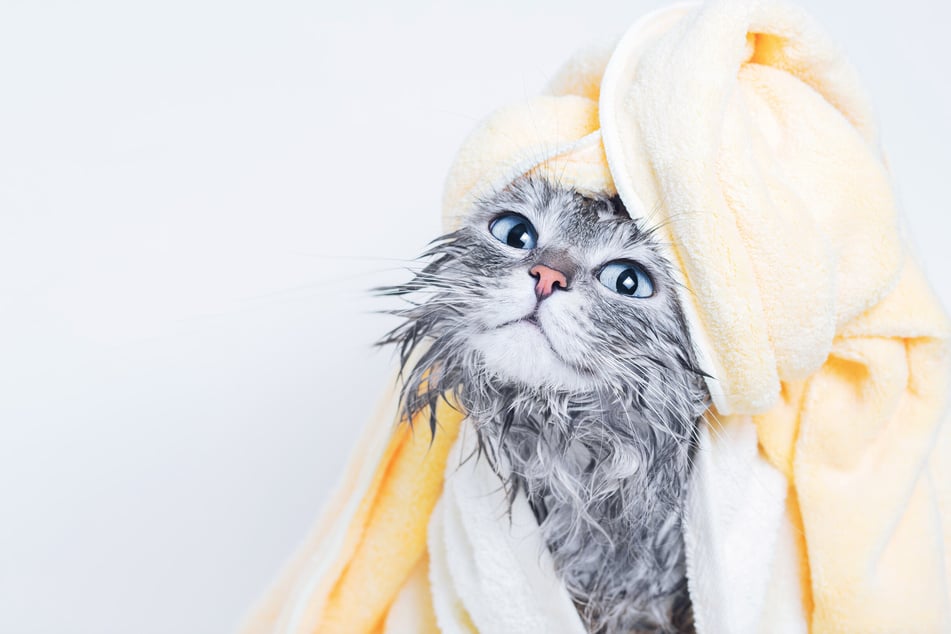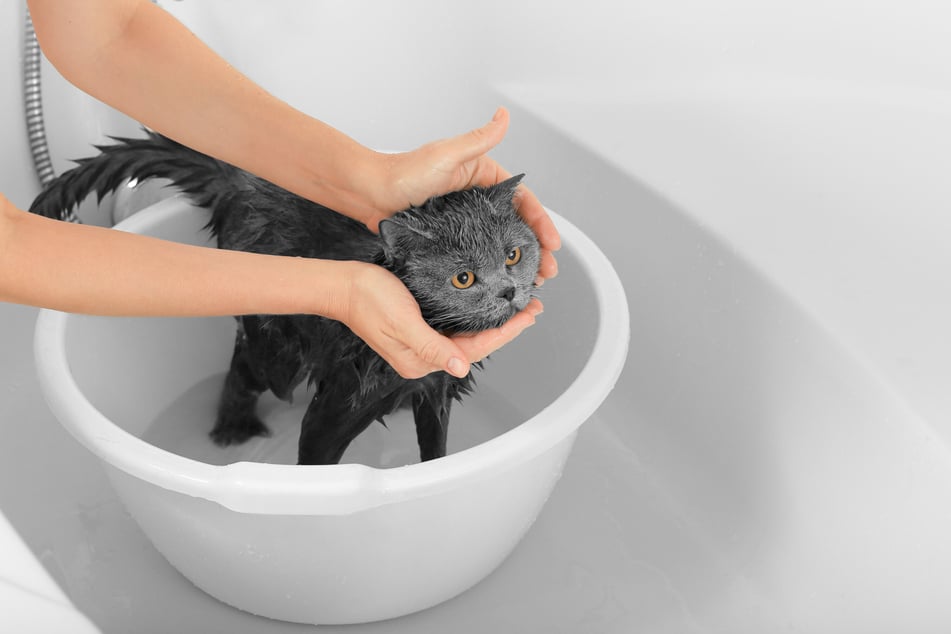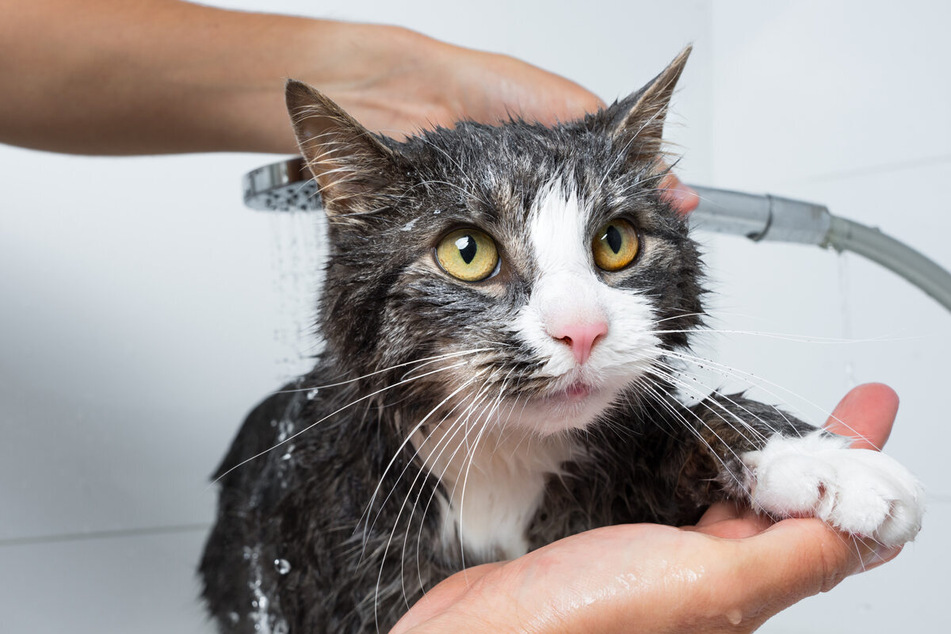Do cats need baths? Should I bathe my cat?
Considering a feline's meticulous cleaning habits, do you need to bathe your cat? If so, how on Earth do you give your cat a bath without getting attacked by that spiky little fluff ball?

Cats spend almost four hours cleaning themselves every day, so if they ever wanted to save themselves some time, taking a bath would make a lot of sense!
These water-hating mammals hardly ever take advantage of this tried and tested cleaning method, but what if they did?
In this cat guide, TAG24 takes a look at whether it's a good idea to bathe your cat or whether it's simply a recipe for scratched-up arms. If it is a good idea, how do you give your cat a bath?
Should you bathe cats?
It's not generally necessary to bathe your cat, as they clean themselves thoroughly, but it may become necessary in certain circumstances. There are only a few situations in which giving your cat a bath is a must, and you should only do so after consulting a veterinarian.
When should you give your cat a bath?
- If your cat has fleas or some other fur-based parasite
- In the case that your cat is unable to clean itself properly
- When your cat has come back extremely dirty, covered in stuff it probably shouldn't consume when cleaning itself
- If your cat is old and struggles to clean itself effectively
Be careful when you give your cat a bath, however, as there can be some very real danger points. Let's take a look.
How often should I bathe my cat?
The regularity at which cat-washing is necessary depends entirely on the reason why it's needed in the first place, your cat's age, and its fur. You should never start giving your cat a bath every day, as this can greatly irritate the skin, but you can develop a schedule if necessary.
Ultimately, cat baths may need to get more regular if your feline friend is old, sick, an outdoor kitty, extremely dirty, or infected with something skin or fur-related.
How to bathe a cat
Let's not beat around the proverbial bush: bathing your cat is going to be a pain in the backside. It could also cause you very real harm, especially if your cat hates water, as most do. The trick is to reduce stress levels all round, so here's a relatively fool-proof method.
Here's how to give your cat a bath:
Step 1: Pour some lukewarm water into the tub, adding a small amount of cat-approved shampoo (given to you by your vet).
Step 2: Prepare a towel with which you can dry your cat afterward. Additionally, prepare a small container of clean water, to be used for rinsing out the shampoo.
Step 3: Carefully place your cat in the bath and start to wet it with the water, washing it gently with the help of another person. It is best to get someone to hold your kitty still while you scrub.
Step 4: When you have finished washing your cat, use the clean water to gently wash out the shampoo.
Step 5: Use a towel to calmly and gently dry the cat, getting most of the water out of its fur so it isn't dripping wet and will dry faster.
Important: If you are bathing your cat due to infection with fleas or parasites, you need very special, particular type of shampoo. Get this provided to you via consultation with your veterinarian.

Best cat shampoo
You should never use human shampoo for cats, as their skin is extremely sensitive. You will cause your cat a great deal of distress and inflammation, and many human shampoos can even be toxic when consumed by your feline friend.
Make sure to speak with your vet and secure yourself a proper cat shampoo designed to moisturize instead of drying out its skin. If your kitty has fleas, get a specialized shampoo, and if you have no shampoo at hand (but your cat needs an urgent bath), then simply use lukewarm water with no other cleaning agent.
How to bathe a cat that hates water
If your cat despises water, it's quite likely that you will struggle to get it bathed. The first thing you need to do is ask yourself this fundamental question: Do you really need to give your cat a bath?
If the answer is "yes," then your first step will be to get it used to water. Do it slowly, from an early age, and be patient with your feline friend. It may get scared, so give it a nice little pat, lightly wet its fur, and keep yourself as calm as possible.
It can be a bit more difficult to bathe older cats, so it is important to approach the situation with a great deal of calm. Never use a direct stream of water with them, and certainly don't splash an anxious or older cat. Instead, slowly place your cat in the pre-filled tub, and go from there.
Here are a couple of tips to help you bathe your cat:
Tip 1: Prepare some treats for your cat, and use them as a reward for good behavior throughout the bathing process.
Tip 2: Use something smearable and delicious for your cat, like canned salmon or tuna, and put a little bit on the inside of the tub. Allow your cat to lick this paste and use it as a distraction as you give it a bath.
Can you shower cats?

In the case of a parasite infestation or fleas, cats may need a bath for treatment. You should never shower a cat, though, certainly not a hot one.
Use the bath, consult your doctor, get some medication, and use an appropriate shampoo, but don't put your pet in the shower.
Hot water will irritate your cat's skin, as well as its highly sensitive nose, and can even cause burns. On top of that, a shower's water pressure can be highly distressing for your kitty, and may cause it to freak out.
You don't want to make your cat unhappy, so use a bath not a shower.
Do you bathe your cat?
If you just want to give your cat a bath for funsies, don't do it. If you have to bathe your cat because of health reasons, then be very careful and remember to always speak to your veterinarian before you start. Regular bathing could irritate your cat's skin, and that's not something you want.
Baths are not a relaxing, chilled-out experience for kitties like they are for us humans. To mitigate the stress, keep the water relatively lukewarm, be extremely careful, only use vet-approved shampoo, and wear thick gloves. Good luck!
Cover photo: 123RF / Kddesignphoto



